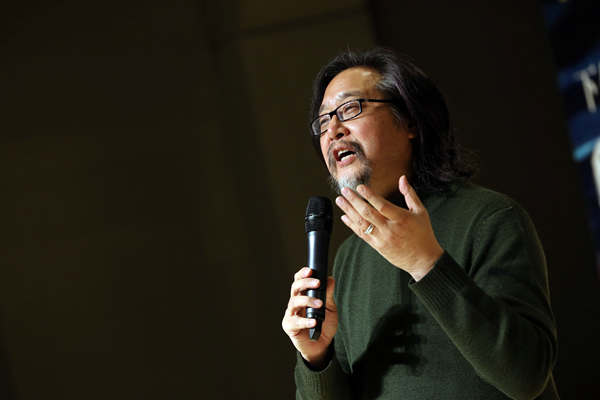Tragedy and humor found an inch apart
By Han Bingbin ( China Daily ) Updated: 2014-01-24 11:21:01
 |
|
Taiwan theater director Stan Lai's latest productions, The Seagull and I Take Your Hand in Mine, bring audiences close to Russian playwright Anton Chekhov. [Photo by Jiang Dong/China Daily] |
He sees himself as an apprentice and loyal fan of William Shakespeare. But he is unwilling to stage any of the Bard's works. Instead, on the few occasions he has adapted another person's work, he has always turned to Anton Chekhov. Now, in addition to a retelling of the Russian playwright's classic The Seagull, he also plans to take on I Take Your Hand in Mine.
Written by New York University teacher, playwright and Chekhov expert Carol Rocamora, Hand is a look at the relationship between Chekhov and his actress wife Olga Knipper. During their brief marriage, the couple lived mostly apart, as Olga spent most of her time touring the country performing and Chekhov was forced to stay at home to write.
They communicated through more than 400 letters, in which they discussed art and life. It is these letters on which the play is based.
"In I Take Your Hand in Mine, you will see the relationship, love, and times of Chekhov and his works," Lai says. "Audiences will find themselves not at all far from Chekhov."
Chekhov was charmed by Knipper when she played the lead in The Seagull. Throughout their marriage the two artists would work together, with Knipper performing her husband's scripts that were probably inspired by her in the first place. This interesting connection led Lai to an experimental arrangement-the two mutually interpretative plays will be shown on the same day with only a short supper break.
Last year, Lai wowed audiences and critics with an experimental eight-hour epic A Dream Like a Dream, which weaves several characters' dreams and realities into a seamless structure that echoes Buddhist beliefs about life and death.
"It seems that after the eight-hour experience we are no longer satisfied with two-hour plays," the director jokes.
When Lai read Chekhov for the first time as a drama student at UC Berkeley, he failed to notice the phrase: "a four-act comedy"-a description that later confused him because Chekhov's work seems so unrelentingly bleak. That same confusion was probably shared by Russian dramatist Constantin Stanislavski.
|
|
|
|
|
|
|
|























 Raymond Zhou:
Raymond Zhou: Pauline D Loh:
Pauline D Loh: Hot Pot
Hot Pot Eco China
Eco China China Dream
China Dream China Face
China Face





